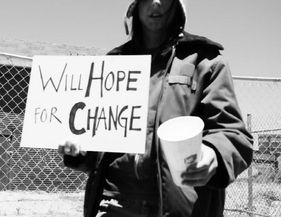
Writer’s Name: S.F. Hardy
Title: Free or Not to Be
Once again we visit my biggest fear and the reality of many people in my city, Detroit. Those less fortunate to have a home are not hard to find. Many can be spotted under the viaducts along with all of their worldly possessions. Just the other day I saw a lady walking down my street with what appeared to be everything she owned in her hand. At night, Downtown Detroit is no exception as the homeless sleep on park benches and entryways of closed businesses.
After speaking with one of the prisoners who frequents the library, whom we will call Prisoner X for obvious reasons, I learned that once he is released he will most likely face homelessness. According to the US Department of Justice, “More than 10 percent of those coming in and out of prisons and jail are homeless in the months before their incarceration.” Prisoner X is no exception to this reality. He is maxing out of his time and therefore will not be under the supervision of the state (parole) once he is released and therefore he is not required to live in a half-way home as a condition of his release. All this may sound good to the average person who has not a clue to how the process works, however, with a felony on his record and no immediate employment prospects in sight, Prisoner X anticipates homelessness to be his fate.
It is not realistic to expect that prisoners will reenter society with gainful employment. What is realistic and often the norm is those released from prison are disenfranchised from employment opportunities due mostly impart to their criminal record. Many employers don’t want to run the risk of hiring those with felony records, while others are restricted by laws as well as high insurance premiums. This alone poses an enormous problem for former prisoners who need affordable housing.
Transitional Housing is not plentiful and often competing with those who don’t have a record for housing. Public housing is limited and restricted by local and federal laws and ordinances. The reasons for denial of housing, both public and private to those with criminal backgrounds vary, The Reentry Policy Council explains:
“The US Department of Housing and Urban Development (HUD) has a number of policies, commonly referred to as the "One Strike and You're Out" policy, that require all Public Housing Authorities (PHAs) or federally assisted housing providers to deny housing to a variety of categories of people: individuals previously evicted from public or federally subsidized housing for drug-related criminal activity; individuals subject to lifetime registry under state sex offenders registration programs; individuals convicted of methamphetamine production on public housing premises; individuals currently abusing alcohol in a manner that interferes with the health, safety, or peaceful enjoyment of the premises by other residents; and individuals currently using illegal drugs. In addition, federal statutes authorize PHAs to reject from housing or terminate the lease of households where any household member's drug use, alcohol abuse, or criminal behavior threatens other residents. While there is substantial local discretion in making these decisions, some assisted housing providers, including local housing agencies, have used their authority to make wholesale rejections of the application by persons with criminal histories...”
Although it makes common sense that those released will be less likely to recidivate if they are released to homes of family members, often this is impossible. Family members who want to take their loved ones in are often prohibited by the terms of their lease for allowing individuals with criminal backgrounds to dwell in their home.
Someone who I am personally familiar with was recently released from prison. He was all too happy to reenter society where he would live with his mother until he could solidify employment and therefore afford housing for himself. For several months everything went well until he was required to fill out a leasing application at which time his criminal past began to haunt him. You guessed it! Because of his criminal past, the gentleman was forced to move from his mother’s apartment or she would be evicted as well. With no family or friends in the county he was released to, the man had to move in with a friend who dwells in a separate county than the one in which he was released. As a result, his probation officer had to be changed among other things.
I am told by both Prisoner X as well as the gentleman above that they want to do everything legally possible to ensure and maintain successful reentry in to society. Although they acknowledge living with others and not having a place of their own to call home is a form of homelessness often overlooked they are appreciative of family and friends who reach out to help them in their journey to remain free and off the streets. However, they state that the odds are against them. How can society make it easier for individuals to reenter society after they have paid their debt to society?
For a list of housing options and types for people released from correctional Facilities visit: (http://reentrypolicy.org/Report/PartII/ChapterII-D/PolicyStatement19/ResearchHighlight19-6)
References
http://reentrypolicy.org/Report/PartII/ChapterII-D/PolicyStatement19/ResearchHighlight19-3
 RSS Feed
RSS Feed
